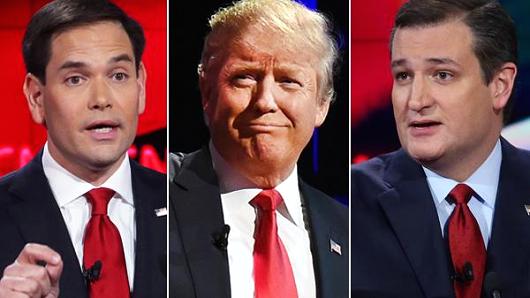James Kerian: We Are In For A Long Primary Season

“It’s tough to make predictions, especially about the future.” – Yogi Berra
Last July I predicted that “When we look back at this next spring it is going to be obvious that Donald Trump’s recent rise in the polls showed (yet again) only just how useless these early polls are.” So I am 0-1 on predictions so far this cycle. Like a lot of other people I underestimated both Trump’s appeal and his skill as a politician.
On the other hand, after the Iowa Caucuses last night, that’s the same record that Trump now has as a candidate.
With all due humility on account of my paltry record I will make a second prediction: We are in for a long primary season.
Three candidates emerged last night as remaining contenders for the GOP nomination; Cruz (winning 8 delegates), Trump (winning 7 delegates) and Rubio (also winning 7 delegates). The only other candidates to win delegates were Ben Carson (3 delegates), Rand Paul (1 delegate), and Jeb Bush (also 1 delegate).
Huckabee has dropped out of the race and a few more may follow this week. After the New Hampshire primary next week we may be down to only six or seven candidates, but I suspect the field will stay that size for quite a while.
Cruz, Trump, and Rubio may be the only candidates with a viable path to the nomination but as long as a plurality (rather than an outright majority) is determining the winner in each primary I expect that any candidate winning any delegates whatsoever will stay in this race. The more delegates a candidate wins the more bargaining power they will have if no one is able to win an outright majority before the convention. That bargaining power is going to tough to pass up for many of these candidates who have no shot at actually becoming the nominee.
Furthermore, as Politico recently reported, rules changes further increase the likelihood of a drawn out race:
“After the 2008 GOP primary, in which 34 states voted by February 5, Republican Party leaders concluded that the frontloaded calendar had given John McCain a too-early primary win and allowed the Obama-Clinton primary to capture a lopsided share of attention. In response, those GOP leaders pushed through new calendar rules designed to create a longer, more contested race: They encouraged states to push their primaries later, and required states voting during the first two weeks of March to agree to allocate their delegates proportionally according to the voting results, rather than in a winner-take-all fashion, making those contests far less decisive.”
In recent history the race was all but wrapped up by the Super Tuesday primaries in early March. This year, however, it is quite likely that this race will remain competitive at least well into April.
I won’t go so far as to predict a brokered convention (though that is certainly possible) but between the calendar and the built-in motivations for the lower-tier candidates to stick around I expect this to be the longest and most drawn-out GOP primary of my lifetime.




